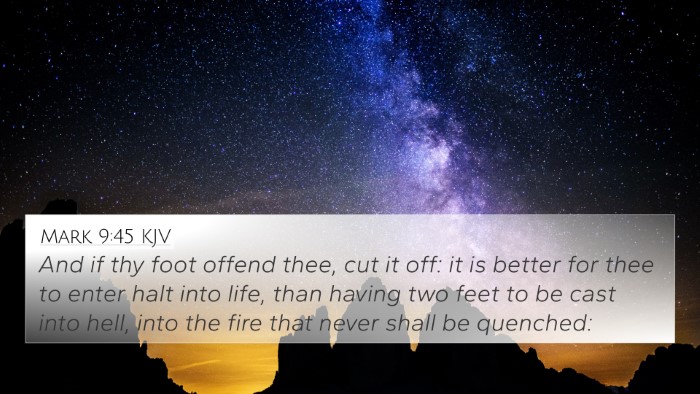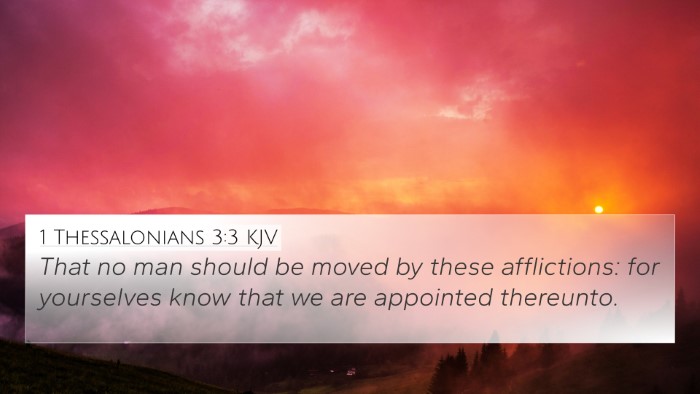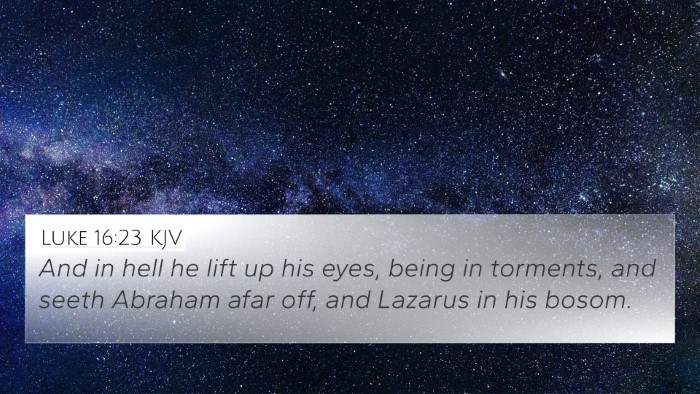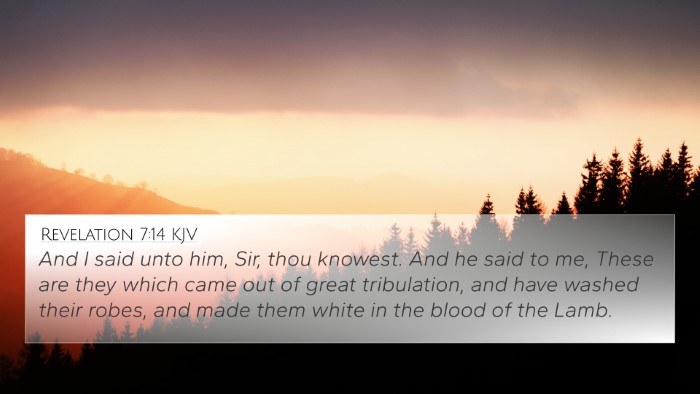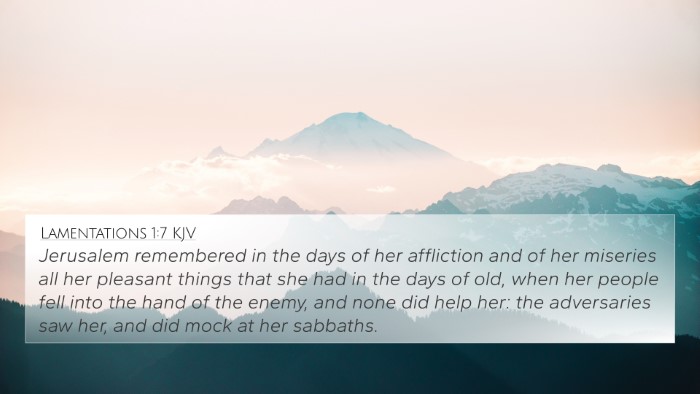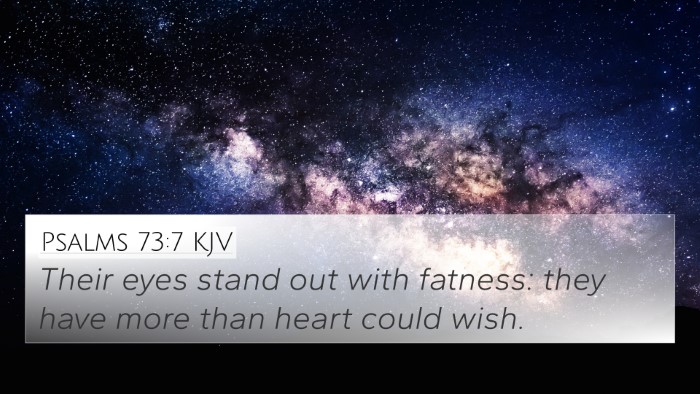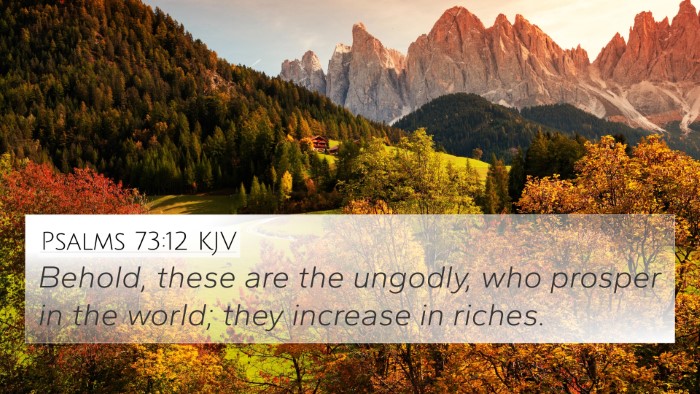Understanding Luke 16:25 - A Summary of Insights
Luke 16:25 states, "But Abraham said, 'Son, remember that in your life you received your good things, while Lazarus received bad things, but now he is comforted here and you are in agony.'"
This verse comes from the parable of the rich man and Lazarus, illustrating the stark contrasts in their lives and afterlives. The rich man, who lived a life of luxury, now finds himself in torment, while Lazarus, who suffered greatly, is now comforted in the bosom of Abraham. This situation highlights profound spiritual truths about justice, the afterlife, and moral responsibility.
Commentary Insights
-
Matthew Henry's Commentary:
Matthew Henry emphasizes the lessons about the reversal of fortunes in the afterlife. He notes that this parable powerfully illustrates how earthly wealth and comfort do not guarantee divine favor and indicates the importance of remembering your actions on earth. The rich man's lack of compassion for Lazarus is highlighted as a significant factor in his fate.
-
Albert Barnes' Notes:
Albert Barnes delves into the notion of memory and its implications. The rich man is reminded of his past comforts, indicating that in hell, individuals will retain knowledge of their lives. This remembrance serves as an eternal torment, showcasing the value of choices made during earthly existence and reinforcing the idea of retributive justice in the afterlife.
-
Adam Clarke's Commentary:
Adam Clarke suggests that the dialogue between Abraham and the rich man serves to convey a clear message regarding divine justice. Clarke discusses the contrast between earthly lives and spiritual destinies, asserting that God’s judgment ultimately aligns with one's treatment of others. The rich man's plea for mercy yet his previous neglect of Lazarus illustrates the irony of his situation.
Biblical Context and Cross-References
Luke 16:25 serves as a pivotal point in understanding various biblical themes involving wealth, responsibility, and the afterlife. Significant themes include:
-
Hebrews 9:27: "And just as it is appointed for man to die once, and after that comes judgment."
-
Galatians 6:7: "Do not be deceived: God is not mocked, for whatever one sows, that will he also reap."
-
Matthew 25:46: "And these will go away into eternal punishment, but the righteous into eternal life."
-
Luke 12:16-21: The parable of the rich fool, depicting the folly of hoarding wealth without being rich toward God.
-
James 5:1-3: A warning to the rich about the misery that will come upon them due to their exploitation and hoarding of wealth.
-
Psalm 37:28: "For the LORD loves justice; he will not forsake his saints."
-
Revelation 20:11-15: The great white throne judgment, demonstrating the finality of God's judgment.
Interpretative Themes and Lessons
The lesson echoed throughout Luke 16:25 and its surrounding context reveals not only a warning against complacency amongst the wealthy but also a call for compassion towards the less fortunate. The spiritual truths illustrated here resonate deeply within the fabric of Christian teachings on charity, humility, and the pursuit of eternal treasures rather than temporal gains.
Connections to Other Bible Verses
This verse can be cross-referenced with several others to fully understand the thematic connections in Scripture:
-
Proverbs 14:31: "Whoever oppresses a poor man insults his Maker, but he who is generous to the needy honors him."
-
Isaiah 25:8: "He will swallow up death forever; and the Lord God will wipe away tears from all faces."
-
2 Corinthians 5:10: "For we must all appear before the judgment seat of Christ."
-
1 John 3:17: "But if anyone has the world’s goods and sees his brother in need, yet closes his heart against him, how does God’s love abide in him?"
Practical Application
As believers study Luke 16:25, they are encouraged to reflect on personal attitudes toward wealth and generosity. The call to action is clear: show kindness and compassion to those who suffer, understand the temporality of earthly pleasures, and prioritize spiritual well-being over material gain. By engaging in cross-referencing Biblical texts, readers can gain a deeper understanding of how interconnected these spiritual principles are across Scripture.
Conclusion
Luke 16:25 encapsulates profound truths regarding justice, mercy, and the eternal consequences of our actions. Through cross-referencing biblical texts and exploring connections between Bible verses, readers can appreciate the holistic message conveyed throughout Scripture about the moral implications of earthly living and the promise of eternal life as it relates to our earthly actions.






